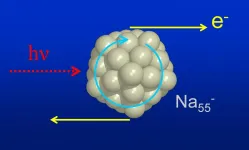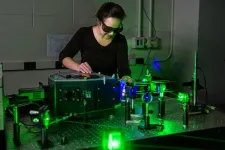(Press-News.org) A study of media coverage of 623 scientific papers on Alzheimer disease research conducted in mice reveals that the news media are more likely to write a story about alleged breakthroughs or medical research findings if research authors omit mice from their studies' titles. On the other hand, papers that acknowledge mice in their titles result in limited media coverage.
In addition, the study titled "What's not in the news headlines or titles of Alzheimer disease articles? #In mice" conducted by Dr Marcia Triunfol of Humane Society International and Dr Fabio Gouveia of the Oswaldo Cruz Foundation in Brazil, and published in PLoS Biology, found that the resulting media coverage generated by papers with "missing mice" titles is also more likely to omit mice from their headlines.
This is of concern because scientific findings obtained from animal experiments should be reported with caution due to their limited relevance to human health. The biology and physiology of mice and other animals differ significantly to that of humans, such that research results obtained in animals often fail to be replicated in people. Despite that, the scientific value of articles downplaying that they relied on animal models is actually inflated by their disproportionate media exposure, raising concerns that the public and patients are being misled.
Dr Triunfol, one of the study's authors and Humane Society International's scientific advisor, says: "There are around 200 animal models to study Alzheimer disease, and yet the vast majority of potential treatments discovered through experiments on mice are ineffective when tested in humans. Despite this significant flaw in the animal models, we show that articles glossing over the fact that the results were obtained using animals are given increased visibility and therefore implied credibility by the media. The reporting of animal research needs to be addressed with far greater caution and more prominent disclaimers in mainstream media to ensure the public understands that the results of animal experiments may have little to no relevance to human patients."
The study's authors looked at research published in 2018 and 2019 in open-access journals and indexed in PubMed. Of the 623 papers reviewed, 405 added 'mice' in the titles but 218 made no mention of mice, despite the fact that in both groups mice were the main research subjects. Using Altmetric Explorer, a web-based platform that allows users to browse a report on digital attention data for research papers, Dr. Gouveia reported that he and Dr. Triunfol found that "when authors omit mice from the paper's title, writers of news stories reporting on these papers tend to follow suit. What we see is that in most cases their headlines do not mention mice either."
The study also shows that papers that omit mice from their titles generate twice the number of social media tweets compared to papers that do mention mice in the title (18.8 tweets against 9.7 tweets, on average).
Some examples of media stories based on mouse results but without mentioning mice in their headlines are " END
Alzheimer disease research results over-hyped if science papers omit mice from the title
Scientists call for accurate reporting of animal studies to avoid misleading the public with exaggerated news headlines
2021-06-15
ELSE PRESS RELEASES FROM THIS DATE:
A push for a shift in the value system that defines "impact" and "success"
2021-06-15
Discussions of a broken value system are ubiquitous in science, especially after the COVID-19 pandemic served to expose inequality globally. However, according to the authors of an article publishing 15th June 2021 in the open access journal PLOS Biology, science itself is not "broken," but it was built on deeply-entrenched, systemic sexist and racist values, which perpetuate biases through the continued focus on citation rates and impact factors.
The author maintain that while equity within science has advanced thanks to the tireless efforts of generations of systemically marginalized groups, the system remains outdated, colonialist, and patriarchal. ...
Financial distress similar, or greater, for patients with heart disease compared to cancer
2021-06-15
Financial toxicity, the financial strain experienced by patients accessing health care, impacts a large population of cancer patients according to prior research. A new study, published in JACC: CardioOncology, finds financial toxicity is often greater among heart disease patients compared to cancer patients, and those with both conditions suffer the highest burden.
"Heart disease and cancer are the leading causes of death in the United States, yet most research on financial toxicity has focused on cancer patients. It is important to consider that cancer patients may have short bursts of high expenditures for treatments, while heart disease patients are often incurring ...
Over half of cardiovascular disease deaths worldwide occur in Asia
2021-06-15
The number of people dying from cardiovascular disease (CVD) in Asia is increasing rapidly, with over half of all CVD deaths globally in 2019 occurring in Asian countries, according to a state-of-the-art review paper published in the inaugural issue of JACC: Asia. The data demonstrates an urgent need to understand the burdens and epidemiological features of CVD in Asian countries to develop localized CVD prevention strategies to combat the epidemic.
From 1990 to 2019, the number of CVD deaths in Asia rose from 5.6 million to 10.8 million. Nearly 39% of these CVD deaths were premature, meaning they occurred in a person less than 70 years old, which was significantly higher than premature CVD deaths in the U.S. (23%). Most ...
Research papers that omit 'mice' from titles receive misleading media coverage
2021-06-15
There is increasing scrutiny around how science is communicated to the public, but what is the relationship between how scientists report their findings and how media reports it to the public? A study published in PLOS Biology by Marcia Triunfol at Humane Society International, in Washington, DC and Fabio Gouveia at Oswaldo Cruz Foundation in Rio de Janeiro, Brazil suggests that when authors of scientific papers omit the basic fact that a study was conducted in mice (and not in humans) from the article title, journalists reporting on the paper tend to do the same.
Alzheimer's Disease is an exclusively ...
The long view
2021-06-15
What will the Earth be like for our children and grandchildren, as temperatures continue to rise? We can be fairly certain of some things: Some regions will become inhospitable, as heat drives their inhabitants away or causes massive declines and changes in their ecosystems. Many other physical, chemical and biological processes will also be affected by rising temperatures that threaten critical ecosystem services such as food production, biodiversity and energy security.
But what these changes will be and exactly how they impact the Earth -- and ultimately us humans -- are still difficult to predict. Many of them are so gradual and happen over such a long timescale that they wouldn't be noticeable ...
Drug rebates for insurers tied to higher costs for patients, especially the uninsured
2021-06-15
Federal agencies that regulate drug pricing and healthcare insurance are concerned that an industry practice of using rebates to lower drug costs for insurers has led to increases in list prices and out-of-pockets costs for patients.
To investigate whether patients with or without insurance were paying more because of rebates to insurers, researchers led by the University of Washington examined cost and price data on more than 400 branded drugs. The study found that rebates were associated with increases in out-of-pocket costs for patients by an average of $6 for those with commercial insurance, $13 for Medicare ...
New Web Tool Fights Antibacterial Resistance
2021-06-15
In 1943, two scientists named Max Delbrück and Salvador Luria conducted an experiment to show that bacteria can mutate randomly, independent of external stimulus, such as an antibiotic that threatens a bacterial cells' survival. Today the Luria-Delbrück experiment is widely used in laboratories for a different purpose--scientists use this classic experiment to determine microbial mutation rates. When performing the Luria-Delbrück experiment, scientists need efficient computer algorithms to extract reliable estimates of mutation rates from data, and they also need well-designed software tools to access these sophisticated algorithms.
Through the years, several web tools that allow researchers to more easily input and analyze data on a computer were developed to increase ...
The electron merry-go-round
2021-06-15
Photoemission is a property of metals and other materials that emit electrons when struck by light. Electron emission after light absorption was already explained by Albert Einstein. But since this effect is a highly complex process, scientists have still not been able to fully elucidate its details. Prof. Dr. Bernd von Issendorff and his team at the University of Freiburg's Institute of Physics have now succeeded in detecting a previously unknown quantum effect in the angular distributions of photoelectrons from cryogenic mass-selected metal clusters. ...
Sequencing of wastewater can help monitor SARS-COV-2 variants
2021-06-15
Washington, D.C. - June 15, 2021 - Viral genome sequencing of wastewater can provide an early warning system of emerging SARS-CoV-2 variants that is independent of investigations of identified clinical cases, according to a new study published in mSystems, an open-access journal of the American Society for Microbiology. In the study, researchers describe the detection and quantification of variant B.1.1.7, first identified in southeast England, in sewage samples from London, United Kingdom before widespread transmission of this variant was obvious from clinical cases.
"Wastewater sampling and environmental surveillance ...
Soaking up the sun: Artificial photosynthesis promises clean, sustainable source of energy
2021-06-15
Humans can do lots of things that plants can't do. We can walk around, we can talk, we can hear and see and touch. But plants have one major advantage over humans: They can make energy directly from the sun.
That process of turning sunlight directly into usable energy - called photosynthesis - may soon be a feat humans are able to mimic to harness the sun's energy for clean, storable, efficient fuel. If so, it could open a whole new frontier of clean energy. Enough energy hits the earth in the form of sunlight in one hour to meet all human civilization's energy needs for an entire year.
Yulia Puskhar, a biophysicist and professor of physics in Purdue's College of Science, may have a way to harness that energy by mimicking plants.
Wind ...
LAST 30 PRESS RELEASES:
KRICT develops microfluidic chip for one-step detection of PFAs and other pollutants
How much can an autonomous robotic arm feel like part of the body
Cell and gene therapy across 35 years
Rapid microwave method creates high performance carbon material for carbon dioxide capture
New fluorescent strategy could unlock the hidden life cycle of microplastics inside living organisms
HKUST develops novel calcium-ion battery technology enhancing energy storage efficiency and sustainability
High-risk pregnancy specialists present research on AI models that could predict pregnancy complications
Academic pressure linked to increased risk of depression risk in teens
Beyond the Fitbit: Why your next health tracker might be a button on your shirt
UCSB scientists bottle the sun with liquid battery
Lung cancer drug offers a surprising new treatment against ovarian cancer
When consent meets reality: How young men navigate intimacy
Siemens Healthineers and Mayo Clinic expand strategic collaboration to enhance patient care through advanced technology
Physicists develop new protocol for building photonic graph states
OHSU-led research initiative examines supervised psilocybin
New review identifies pathways for managing PFAS waste in semiconductor manufacturing
New research finds state-level abortion restrictions associated with increased maternal deaths
New study assesses potential dust control options for Great Salt Lake
Science policy education should start on campus
Look again! Those wrinkly rocks may actually be a fossilized microbial community
Exposure to intense wildfire smoke during pregnancy may be linked to increased likelihood of autism
Children with Crohn’s have distinct gut bacteria from kids with other digestive disorders
Genomics offers a faster path to restoring the American chestnut
Caught in the act: Astronomers watch a vanishing star turn into a black hole
Why elephant trunk whiskers are so good at sensing touch
A disappearing star quietly formed a black hole in the Andromeda Galaxy
Yangtze River fishing ban halts 70 years of freshwater biodiversity decline
Genomic-informed breeding approaches could accelerate American chestnut restoration
How plants control fleshy and woody tissue growth
Scientists capture the clearest view yet of a star collapsing into a black hole
[Press-News.org] Alzheimer disease research results over-hyped if science papers omit mice from the titleScientists call for accurate reporting of animal studies to avoid misleading the public with exaggerated news headlines


